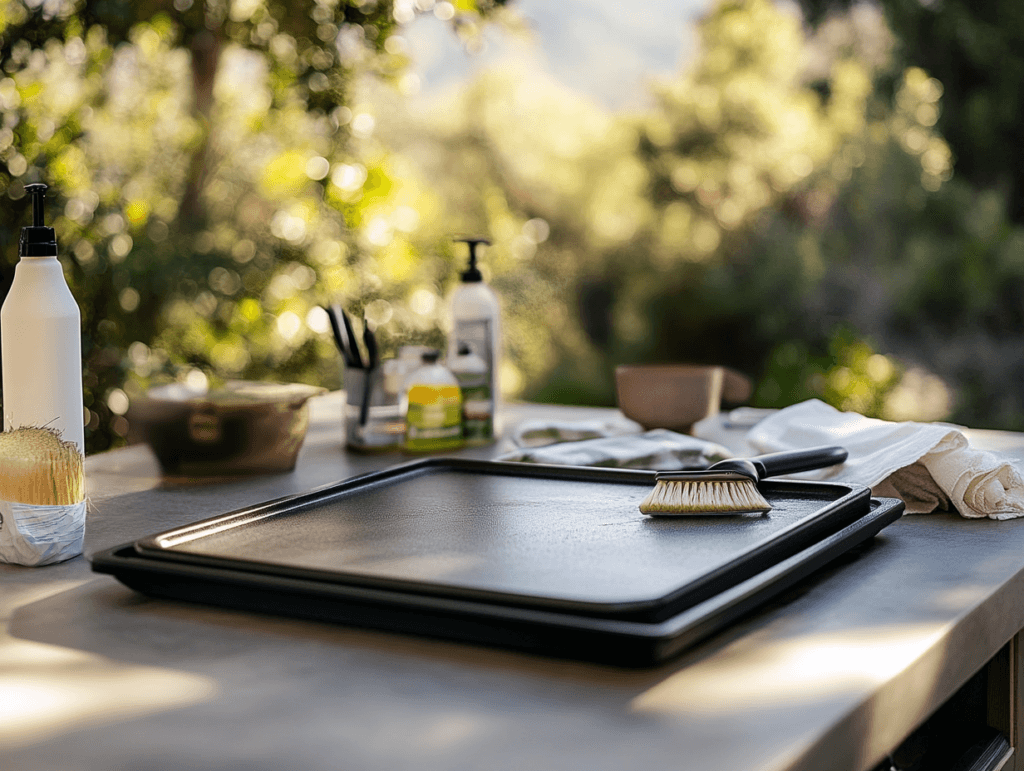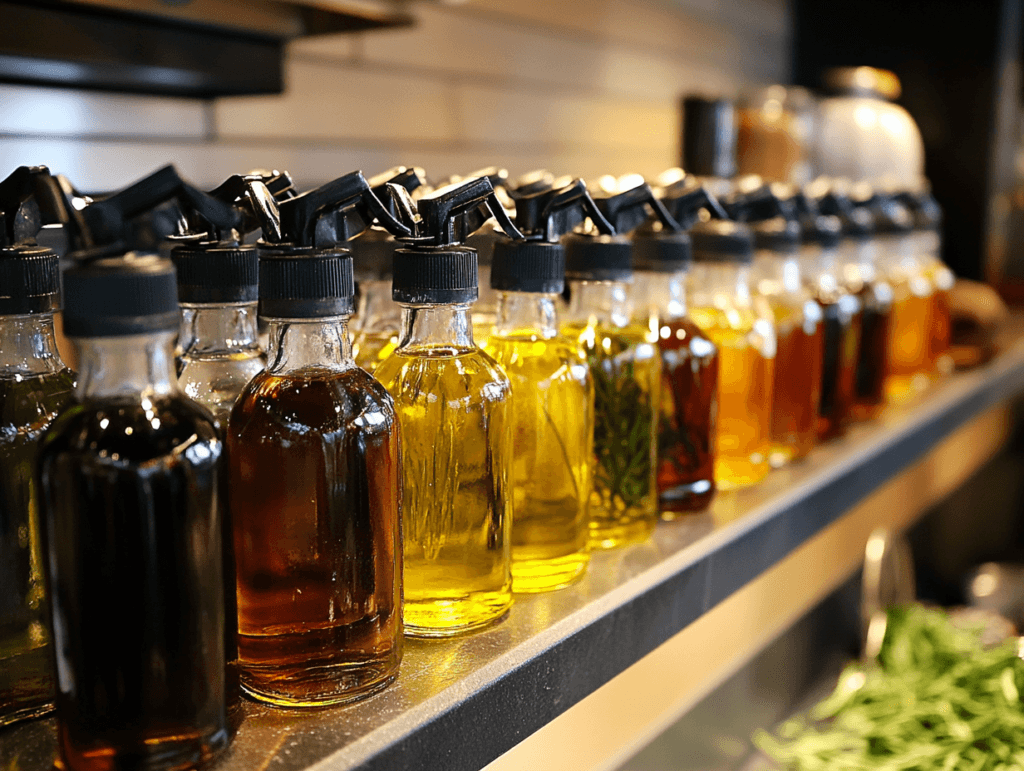When it comes to outdoor cooking, Blackstone griddles are a favorite for their versatility and ease of use. However, their performance heavily relies on proper seasoning and oiling. Whether you’re a seasoned griddle user or a beginner, knowing the best oils to use will elevate your cooking experience and keep your griddle in pristine condition. This article delves into the best oils for Blackstone griddles and why choosing the right one is so crucial.
Table of Contents
Why Choosing the Right Oil for Blackstone Griddles Matters
The oil you select for your Blackstone griddle isn’t just about flavor; it significantly impacts the longevity of your griddle and the quality of your cooking. Here’s why making the right choice is essential:
How Oil Protects Your Blackstone Griddle Surface
A Blackstone griddle is made of steel, which is prone to rust if not maintained properly. Using the right oil forms a protective layer over the surface, shielding it from moisture and environmental elements. This layer, known as seasoning, prevents rust and ensures the griddle lasts for years.
Enhancing Food Quality with the Right Oil
Some oils impart subtle flavors to your dishes, while others allow the natural flavors of your ingredients to shine. Choosing an oil with a high smoke point prevents unpleasant burnt flavors and ensures a smooth cooking process.
Making Cooking and Cleaning Easier with Oil on Blackstone
Properly oiled griddles create a non-stick surface, reducing the risk of food sticking and making cleanup easier. Oils with low residue help keep the surface free from build-up, ensuring a seamless cooking experience.
Top Oils for Blackstone Griddles
Different oils serve various purposes when using a Blackstone griddle. Here’s a breakdown of the best oils for seasoning, cooking, and maintenance:
1. Best Oils for Seasoning
Seasoning your Blackstone griddle creates a non-stick, rust-resistant surface. The following oils are ideal for this purpose:
Why Flaxseed Oil is Ideal for Blackstone Seasoning
- Why It’s Great: Flaxseed oil is highly recommended for seasoning due to its high polymerization properties, which create a durable and hard coating.
- Drawbacks: It can be expensive and less accessible than other options.
Benefits of Using Canola Oil for Blackstone Griddles
- Why It’s Great: Widely available and affordable, canola oil has a high smoke point and neutral flavor, making it a popular choice.
- Drawbacks: Its coating may not be as durable as flaxseed oil’s.
Grapeseed Oil: A Great Choice for Blackstone Cooking and Seasoning
- Why It’s Great: Grapeseed oil offers a high smoke point and creates a smooth, even seasoning layer.
- Drawbacks: Slightly more expensive than canola oil.
2. Best Oils for Cooking
For everyday cooking on your Blackstone griddle, consider these oils:
Vegetable Oil
- Why It’s Great: Affordable and easy to find, vegetable oil works well for most cooking needs. Its neutral flavor doesn’t interfere with your dishes.
Avocado Oil
- Why It’s Great: With one of the highest smoke points (around 520°F), avocado oil is excellent for high-heat cooking on a griddle.
Peanut Oil: An Excellent Option for Flavorful Blackstone Recipes
- Why It’s Great: Peanut oil is ideal for stir-fries and fried dishes due to its high smoke point and robust flavor.
How to Season Your Blackstone Griddle with Oil
Seasoning a Blackstone griddle is crucial for long-term performance and durability. The process involves applying multiple thin layers of oil and heating the griddle to bond the oil with the surface. Here’s a step-by-step guide:
1. Importance of High Smoke Point in Oil for Blackstone
Before seasoning, ensure the griddle is clean. Use a mix of warm water and a gentle soap to remove any factory coating or residue. Dry thoroughly.
2. Steps to Apply Oil for Seasoning Your Blackstone Griddle
Choose your oil (flaxseed, canola, or grapeseed are recommended). Apply a thin, even layer over the entire surface using a paper towel or cloth.
3. Heat the Blackstone Griddle to Bond the Oil
Turn on your griddle to high heat. Allow it to heat until the oil starts smoking. This step polymerizes the oil, creating a durable, non-stick layer.
4. Repeat the Process
For the best results, repeat the oiling and heating process 3–5 times. Each layer strengthens the seasoning, enhancing the surface’s non-stick properties.
Factors to Consider When Selecting the Best Oil for Blackstone Griddles
Choosing the right oil for your Blackstone griddle depends on several factors. Understanding these considerations will help you make an informed decision and ensure your cooking experience is flawless.
1. Smoke Point
The smoke point of an oil is the temperature at which it begins to smoke and break down. For griddle cooking, especially at high heat, oils with high smoke points are ideal. Oils with low smoke points may burn quickly, imparting a bitter taste to your food and creating sticky residue on the griddle surface.
Examples of High Smoke Point Oils:
- Avocado oil (520°F)
- Peanut oil (450°F)
- Canola oil (400°F)
Avoid: Oils like extra virgin olive oil, which have a lower smoke point (375°F).
2. Flavor Neutrality
For versatility, opt for oils with a neutral flavor. These oils won’t interfere with the taste of your dishes and are suitable for a wide variety of cuisines. For specific recipes, like stir-fries or fried rice, you might choose oils with more robust flavors, like peanut or sesame oil, to complement the dish.
3. Availability and Cost
Some oils, such as flaxseed oil, offer excellent seasoning properties but may be expensive or hard to find. More affordable options like canola oil or vegetable oil are widely available and suitable for both cooking and seasoning.
4. Health Considerations
For health-conscious cooks, oils with higher levels of healthy fats, like avocado or grapeseed oil, are great choices. They’re rich in monounsaturated fats and lower in saturated fats.
Cooking Tips for Using Oil on Blackstone
Using oil effectively can transform your Blackstone griddle into a versatile cooking surface. Follow these tips to optimize your griddle experience:
1. Preheat the Griddle Before Adding Oil
Always preheat your griddle to ensure even heat distribution. Add oil after the griddle is hot, as this prevents food from sticking and helps achieve perfect browning.
2. Use the Right Amount of Oil
Avoid over-oiling, as it can lead to greasy food and sticky residue. A light coating is usually sufficient. For larger meals, you can add more oil as needed during cooking.
3. Match the Oil to the Cooking Technique
- For High-Heat Cooking: Use oils like avocado or peanut oil with high smoke points.
- For Low-Heat or Medium-Heat Cooking: Canola or vegetable oil works well.
- For Specific Flavors: Use oils like sesame or coconut for dishes that benefit from added aroma and taste.
4. Clean as You Go
Oil can leave residue on the griddle, especially if overused. Use a scraper to clear off excess oil and food particles during cooking to maintain a clean surface.
Maintaining Your Blackstone Griddle with Oil
Proper maintenance is key to extending the life of your Blackstone griddle, and oil plays a crucial role in this process.
1. Steps for Post-Cooking Cleanup with Oil on Blackstone
After cooking, allow the griddle to cool slightly and scrape off food debris using a griddle scraper. Wipe the surface clean with a damp cloth or paper towel.
2. Reapplying Oil After Cleaning Your Blackstone Griddle
Once the surface is clean and dry, apply a thin layer of oil to prevent rust and maintain the seasoning layer. Spread the oil evenly across the griddle using a paper towel.
3. Properly Storing Your Blackstone Griddle with a Protective Oil Layer
If you’re not using your griddle for an extended period, coat the surface with oil and cover it to protect against moisture and dust.
4. When to Re-Season Your Blackstone Griddle with Oil
Over time, the seasoning layer may wear down. Re-season the griddle every few months or when you notice food starting to stick.
Common Mistakes with Oil Use on Blackstone

Using oil on your Blackstone griddle is simple, but common mistakes can reduce its effectiveness and even damage the griddle over time. Here are the pitfalls to avoid:
1. Using the Wrong Type of Oil
Choosing oils with low smoke points, like butter or extra virgin olive oil, for high-heat cooking can lead to burnt residue, off-flavors, and a sticky surface. Stick to high smoke point oils such as avocado, canola, or peanut oil for optimal results.
2. Over-Oiling the Griddle
Applying too much oil during seasoning or cooking can cause uneven seasoning layers, greasy food, or build-up on the surface. A thin, even layer of oil is all that’s needed for both maintenance and cooking.
3. Neglecting to Clean After Cooking
Leaving food residue or excess oil on the griddle after cooking can lead to sticky surfaces and difficulty during your next use. Always clean the griddle thoroughly after each session.
4. Forgetting to Reapply Oil After Cleaning
Cleaning removes oil and seasoning layers, leaving the surface vulnerable to rust. Always reapply a thin coat of oil after cleaning to protect the griddle and maintain its performance.
5. Inconsistent Seasoning
Infrequent or uneven seasoning results in a poorly maintained surface, increasing the likelihood of rust and food sticking. Be consistent with your seasoning routine for the best results.
Recommended Brands of Oils for Blackstone
The market offers a variety of oils that work well for Blackstone griddles, but some brands stand out for their quality and reliability. Here are the top recommendations:
1. Flaxseed Oil
- Brand Recommendation: Barlean’s Organic Flaxseed Oil.
- Why It’s Great: Known for its high purity and excellent polymerization properties, this oil is ideal for creating a durable seasoning layer.
2. Avocado Oil
- Brand Recommendation: Chosen Foods 100% Pure Avocado Oil.
- Why It’s Great: This oil’s high smoke point and neutral flavor make it a versatile choice for both seasoning and cooking.
3. Canola Oil
- Brand Recommendation: Wesson Canola Oil.
- Why It’s Great: Affordable and widely available, this oil is a practical option for everyday cooking and seasoning.
4. Grapeseed Oil
- Brand Recommendation: Pompeian 100% Grapeseed Oil.
- Why It’s Great: Its high smoke point and smooth texture make it ideal for maintaining a non-stick surface on your griddle.
Alternatives to Traditional Oils
While traditional oils are popular for Blackstone griddles, there are some alternatives that can enhance your cooking experience:
1. Butter
- Use Case: Adds rich flavor to pancakes, eggs, and other breakfast dishes.
- Drawbacks: Butter has a low smoke point, so it’s not ideal for high-heat cooking or seasoning.
2. Lard or Tallow
- Use Case: Excellent for seasoning and traditional recipes requiring animal fats.
- Drawbacks: May not appeal to those seeking plant-based options.
3. Coconut Oil
- Use Case: Provides a unique flavor for tropical or dessert dishes.
- Drawbacks: Has a relatively low smoke point compared to other oils.
Expert Tips for Storing and Using Oil on Blackstone Griddles
To ensure your oils stay fresh and effective, follow these expert tips:
1. Store Oils Properly
Keep oils in a cool, dark place away from heat and light to prevent them from going rancid. For oils with a shorter shelf life, like flaxseed oil, refrigeration is recommended.
2. Use Fresh Oil
Always check the expiration date before using oil, especially for seasoning. Old or rancid oil can ruin your griddle’s surface and impart unpleasant flavors.
3. Invest in a Squeeze Bottle
For easy application, transfer your cooking oil to a squeeze bottle. This helps control the amount of oil you use and ensures even distribution on the griddle.
4. Avoid Mixing Oils
Different oils have varying smoke points and properties. Stick to a single type of oil for each use to maintain consistency in cooking and seasoning.
FAQs About Oil and Blackstone Griddles
1. Can I Use Olive Oil on My Blackstone Griddle?
Yes, but use caution. Regular olive oil has a low smoke point, so it’s best for medium-heat cooking. Extra virgin olive oil is not ideal for high-heat griddle cooking or seasoning. For a better understanding of how to maintain your griddle, check out How to Clean a Blackstone Griddle After Use for maintenance tips.
2. How Often Should I Season My Blackstone Griddle?
Season your griddle every few months or whenever the seasoning layer begins to wear off. Frequent use may require more frequent seasoning. If you’re looking for inspiration to maximize your griddle usage, explore Blackstone Recipes: A Culinary Adventure for recipe ideas.
3. Can I Cook Without Oil on My Blackstone?
While it’s possible, using oil ensures a non-stick surface and prevents food from burning or sticking. A small amount of oil improves cooking efficiency and enhances flavor. Learn about the best ingredients for your griddle meals in What Is 80/20 Ground Beef? to complement your oil choices.
4. What Happens if I Don’t Oil My Griddle?
Without regular oiling, your griddle can develop rust, food will stick, and its performance will degrade over time. Regular oil application is essential for maintenance. Refer to How to Clean a Blackstone Griddle After Use to ensure your griddle stays in peak condition.
5. Is Butter Better Than Oil for Blackstone Cooking?
Butter adds flavor but isn’t ideal for high-heat cooking or seasoning due to its low smoke point. Use butter for finishing dishes rather than as a base for cooking. For flavorful recipes that pair well with buttery finishing touches, visit Blackstone Recipes: A Culinary Adventure.
Conclusion
Choosing the right oil for your Blackstone griddle is crucial for maintaining its performance, enhancing your cooking experience, and extending its lifespan. From seasoning with flaxseed oil to cooking with high smoke-point oils like avocado or canola, each choice impacts your results. Avoid common mistakes, maintain a consistent oiling routine, and explore recommended methods in How to Clean a Blackstone Griddle After Use to keep your griddle in excellent condition.
With proper care and the right oil, your Blackstone griddle will be a reliable companion for countless delicious meals. For more ideas on how to use your griddle effectively, check out Blackstone Recipes: A Culinary Adventure and make the most of your cooking experience.
Printable Recipe Card
Want just the essential recipe details without scrolling through the article? Get our printable recipe card with just the ingredients and instructions.

